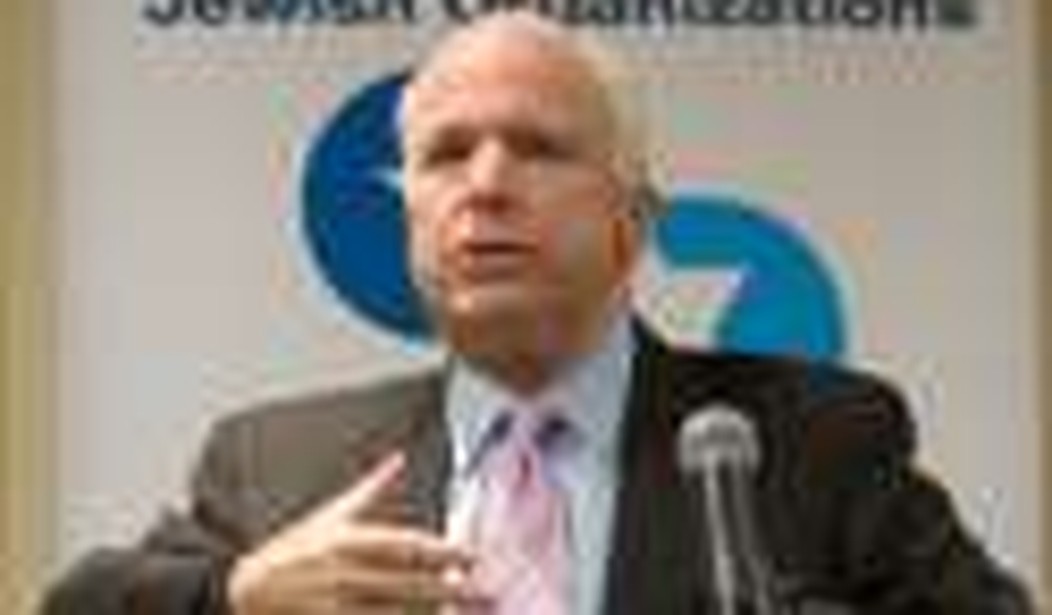The U.S. presidential race and the discussions it is sparking about race, gender issues, involving strong personalities, is a fascinating story — and Israelis are following the drama along with the rest of the world.
Professor Reuven Hazan, a political scientist at the Hebrew University of Jerusalem, is no exception.
“How can anyone not watch what’s going on over there? It’s exciting and it will impact Israel, and therefore it is getting blanket coverage in the Israeli media- Israelis knew who Mitt Romney was, they knew who Huckabee was – they knew all of these guys who even Americans will be hard-pressed to remember in a few months.”
That said, John McCain’s visit to Israel on Tuesday has been almost absent from the headlines in the Israeli press, and one would be hard-pressed to find an Israeli who even knows he is coming. There is little dramatic on his agenda – a brief, one-day visit during which McCain will meet with Prime Minister Ehud Olmert, Foreign Minister Tzipi Livni and Defense Minister Ehud Barak.
“In a way, there’s no reason it should be a big deal,” says Hazan. “He’s not coming to talk to us, he’s coming to talk to his home audience. The way we Israelis perceive the visit is insignificant. He is here to be covered by the American media, do what Reagan began, chip away at the Democratic majority in American Jewish community, and to make the Republican Jews stand up, be proud, help them be able to declare proudly that they support the Republican Party.”
For Israelis, domestic matters dominate the headlines, particularly in the aftermath of the bloody attack on the Jerusalem yeshiva. As far as foreign visitors go – McCain has chosen a busy week to drop by, a week which includes a three-day visit by Germany Chancellor Angela Merkel and Russian Foreign Minister Sergei Lavrov.
Certainly, the McCain visit – his second since he declared his candidacy – won’t go unnoticed.
But as in other parliamentary democracies, the whole spectacle of the primary process in the United States is alien and somewhat difficult for Israelis to relate to.
“We’re following the delegate count and learning what superdelegates are – but
primaries are inherently American by nature. In places like Israel, you just don’t have candidates who decide some bright sunny day who decide that they are fit to run the country, go out and raise money and start campaigning. Over here, you have to join a party, work your way through the party from the bottom up.”
Hazan says that of the three candidates remaining in the race, two of the three are essentially unknown to Israelis.
“McCain is relatively unknown in Israel and abroad despite he’s had a long and distinguished career in Senate – little is known about him other than being a war hero, which of course, will help the Israeli public relate to him… What this guy went through is probably similar to what Gilad Shalit is going through. McCain came back, and you can see that his imprisonment affected him every day. He is a changed person – but yet it didn’t break him. That is something Israelis will admire.”
“As for Obama, people don’t know who he is, other than he’s black, young, charismatic – if you asked Israelis what does he stand for on the issues versus Hillary – their faces would go blank.”
Israelis look skeptically at Obama, and not only because of the problematic pastor and the unrelenting rumors of his family’s Muslim background, but because he is a neophyte, and Israel has had negative experience with untested leaders. “We did that with Netanyahu, tried untested, an utter failure, did that with Ehud Barak – again, a failure. But on the other hand, we’ve got the opposite situation with Ehud Olmert. Here is someone with 30 years in politics who has held cabinet positions, and he’s not doing so great, either.”
Hillary, by contrast, is a known quantity. “We know her as Bill’s wife and she’s a senator from New York, which means she’s had the opportunity and incentive to create connections with Israel. If Israelis voted, Hillary would win the Israeli Democratic primary.”
As important as the next U.S. president and the policies he or she pursues may be for Israel, Israelis are very much watching on the sidelines. “We’re small and far away. We know that this election will primarily focus on economic issues and domestic issues. If there is a foreign issue, it will be Europe and Russia, Iraq and Iran. Israel is simply not on the radar screen for 90 plus percent of the American voting public.”
In addition: “All three of the candidates seem to be doing their utmost to tell Jewish voters that they are pro-Israeli. Many people remember the days where it would have been inconceivable that every candidate – especially those of different parties, different races, and different genders – would all support Israel. It’s not something we take for granted.”
Allison Kaplan Sommer is PJM’s Tel Aviv editor









Join the conversation as a VIP Member